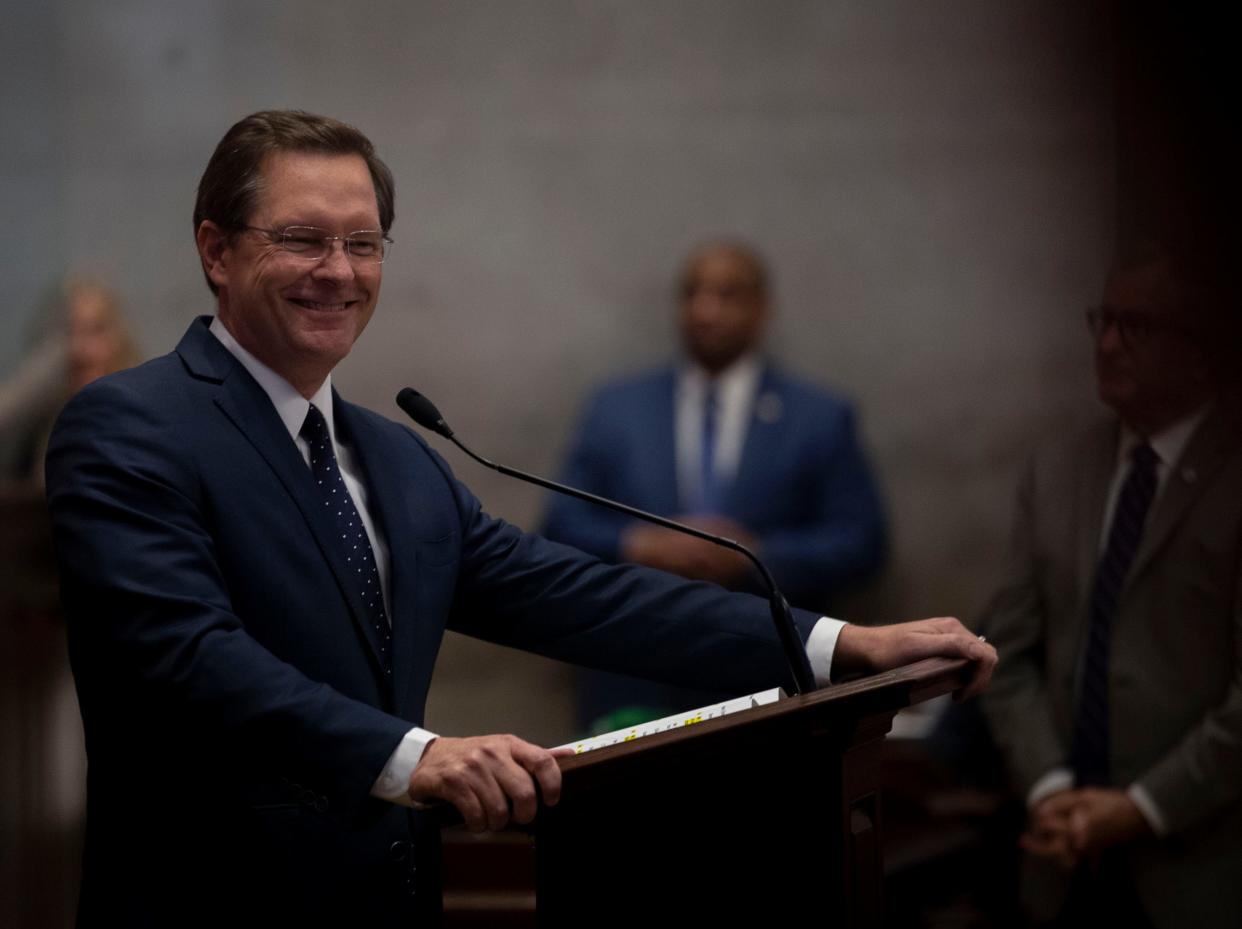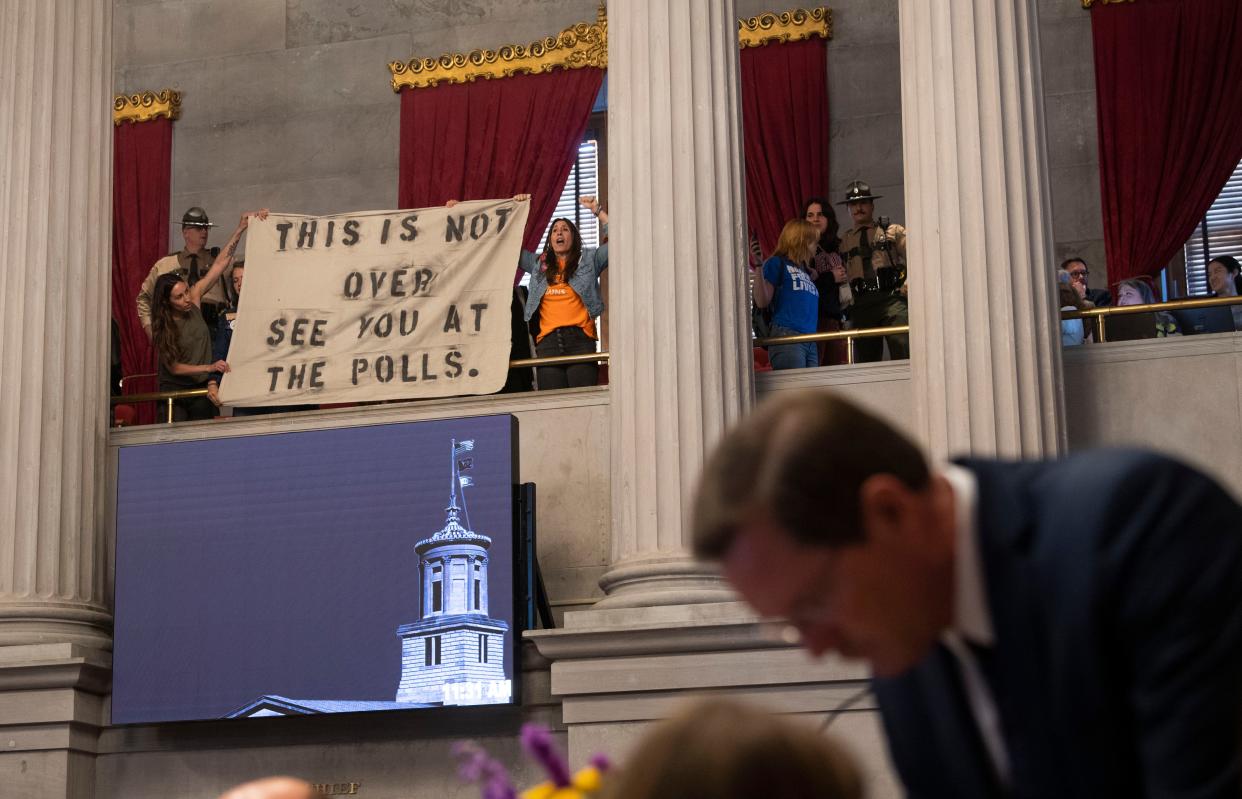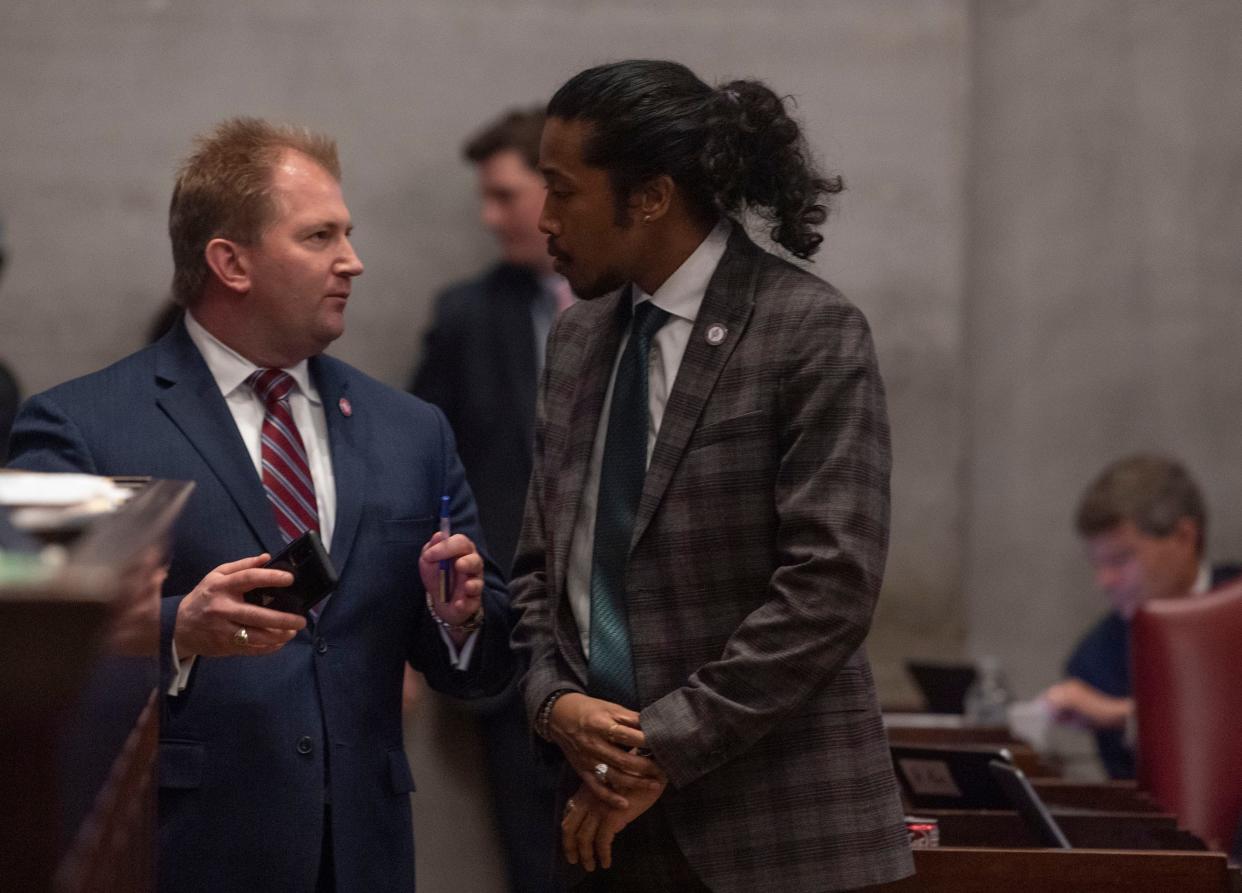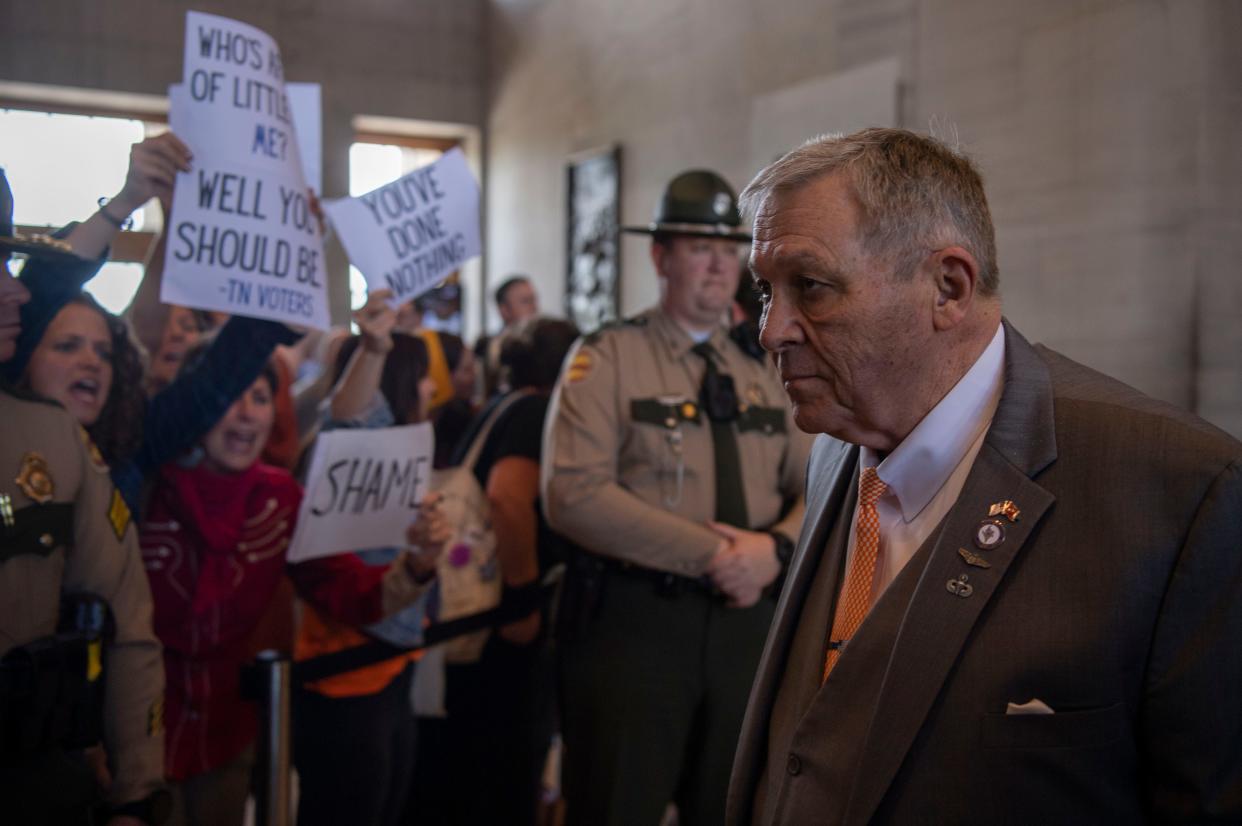Tennessee legislative session ends with failed voucher push, tax overhaul and party feuds
Tennessee Gov. Bill Lee stood in front of cameras in November, eager to announce his plan to expand a school voucher program statewide in 2024.
Flanked by House Speaker Cameron Sexton, R-Crossville, and Lt. Gov. Randy McNally, R-Oak Ridge, Lee spoke of a partnership between the chambers and his office as “five years in the making.”
“We could not and cannot and will not be able to do this without the members of the General Assembly,” Lee said at the time.
In the end, Lee was right. They could not and did not.
The 113th General Assembly adjourned sine die on Thursday, with lawmakers headed back to their districts to embark on the upcoming campaign season without passing Lee's voucher expansion, a signature school choice initiative that, despite its high-profile rollout, never gained momentum and imploded in the final weeks of the legislative session amid an intraparty stalemate. Lee has vowed to push it again next year.
The resulting fallout marred the 2024 session for the two-term Republican governor. Although polling shows he remains popular statewide, he failed to push vouchers across the finish line and settled for a compromise on one of his other top priorities — a $1.9 billion overhaul of the state's franchise tax system.
Meanwhile, lawmakers nixed a Lee administration priority to set aside $25 million for farmland conservation — all on top of the legislature balking last year at the governor's efforts to put in place modest gun reforms following the deadly Covenant School shooting.

The failure of the Education Freedom Scholarships plan was a defeat for Lee, who has long touted school choice as both a political and personal priority. The voucher plan's fate also highlighted continual policy breakdowns between the House and the Senate that emerged in the post-Covenant battles of 2023, though Republican leadership complimented a team effort on franchise tax negotiations after adjournment.
Though Lee proudly announced the voucher expansion plan in November, his office did not publicly deliver legislative details until well into 2024. By then, both chambers had hatched up their own plans and dug their heels in.
Despite leadership reassurance throughout late winter and early spring that all was well, the plan faltered with no consensus in sight, leading Lee to admit surrender on Monday.
The governor and Republican leadership say they'll be better positioned to pursue the proposal in 2025, though it remains unclear if time away from the Capitol and a busy election season will push the initiative ahead next year.
In a post-session news conference, Lee downplayed the legislation's failure, pointing to funding included in the budget for the program, which he said shows the General Assembly's "clear intent" to move forward with an expanded school choice plan.
"This year we made significant progress forward in that effort, "Lee said. "Sometimes very important, big issues take some time to complete. The work we did advanced us to a place where it will be much easier and much more likely that it will get passed next year."
Republicans wielded power — on policy and internal disputes
Whatever the intraparty disagreements, Republicans continue to hold supermajority at the state Capitol and wielded it accordingly this year, particularly in the lower chamber where House leadership kicked off the session by limiting access to a one of two public galleries to those with tickets.
House leadership said they established the ticket system to ensure all members could seat constituents when needed. Opponents pointed out the new system partially shut down access for a large group of protesters, many of whom were hostile to GOP leadership during heated 2023 protests.
Sexton regularly directed waiting troopers to remove protesters from the public gallery during floor sessions, with Democrats critical of the speaker's definition of disruptive behavior, which started as public outbursts and winnowed to hissing and tapping on the metal banister by the final week of session. Elsewhere, committee chairs at times haphazardly misapplied meeting rules on members of the public and media regarding video recording and other behavior.
More: The week in politics: GOP leaders defend enforcement of unwritten rules on Capitol access
Despite widespread public support for some gun restrictions, Republican lawmakers instead increased access to firearms, passing a controversial bill to allow teachers to carry guns in classrooms without parental notification. The GOP also passed a preemption bill blocking local governments from passing extreme risk protection orders.
A group of gun reform protesters was booted from the House gallery on Thursday after unfurling a banner reading, "This is not over. See you at the polls." A lone woman sat throughout the House's final day with a sign thanking lawmakers for passing a controversial bill that would arm some teachers.
"The House has seen a general backslide in democracy, silencing moms, handcuffing protestors, shutting the public out and shutting down dissent," Sen. Jeff Yarbro, D-Nashville said, referring to GOP priorities as the "most extreme version of culture wars, a grievance agenda."
"It's time for principled Democrats, Republicans, independents who care about the future — a coalition of common sense — to come together and start paying attention because this legislature poses a real risk of doing long-term damage to the state," he said.

Tensions frequently spilled over in the House, but more and more cracks began to splinter the lower chamber as the session dragged on. The GOP supermajority held the cards, from the speaker seating disproportionately fewer Democrats on committees to the frequent GOP votes to cut off debate on a wide range of bills.
Reps. Justin Jones, D-Nashville, and Justin Pearson, D-Memphis, continued to get under the GOP's skin throughout the session, and the supermajority frequently responded with minor disciplinary action, which did little except further elevate the young lawmakers’ public platforms as anti-establishment Democrats.

Pearson, who has deliberately questioned most bills that come to the House floor since he was elected to office, was met with obstinance in the final days of session, when one Republican lawmaker refused to answer his substantive questions and another lashed out, accusing Pearson of wasting the chamber's time.
Early and often, the internal fireworks ground House business to a halt and deepened divides between the two parties. Democrats in March accused Republicans of reneging on a deal to maintain at least some of the Tennessee State University board of trustees, which the GOP completely vacated over financial mismanagement concerns.
The supermajority also pushed through an effort to block local governments from passing police reform on traffic stop policies and a controversial juvenile sentencing bill that would automatically transfer some teen juvenile offenders to adult prison.
“This session was the most tough on crime in the history of Tennessee,” Sexton said. “We took additional steps to reduce crime by passing stricter sentencing laws for violent adult and juvenile offenders."
Democrats were powerless to stop a number of culture war bills seen by by some as campaign fodder for Republicans, such as a new school requirement to view a three-minute animated video depicting fetal development, new criminal penalties for helping a minor receive an abortion and a local law enforcement duty to report individuals’ immigration status to federal enforcement authorities.
“This was a session of good, bad and ugly,” Sen. Raumesh Akbari, D-Memphis, said. “We passed some really good bills, we fought against some really bad bills. Unfortunately some really, really bad bills ended up passing."
Lawmakers tout achievements
Still, there was some consensus at the Capitol this year.
A Sexton-backed effort to consolidate Tennessee's disparate court database system into a universal filing system received bipartisan passage and is awaiting the governor's signature. Lawmakers hope the update will improve speed and accuracy in Tennessee's gun background check process as the Tennessee Bureau of Investigation faces a massive backlog of case dispositions not yet linked to people's criminal records.
Legislation to block criminal defendants who are deemed mentally incompetent and unable to stand trial from legally buying or possessing a gun, sparked by the shooting death of Belmont University student Jillian Ludwig last year, received unanimous passage in both chambers.
"There's a lot of things we did this year that will protect our communities, protect our students and protect our citizens," Sexton said.
McNally agreed.
“I am tremendously proud of the work we have done this session,” he said in a statement. “We have reaffirmed our commitment to public safety, increased our investment in education and passed a significant tax cut. And we have done all this during a time of declining revenue." I’m extremely proud that our state history of fiscal responsibility has allowed us to fund our commitments and pass a structurally balanced budget — all the while providing substantial tax relief. "

Though Democrats grumbled, the budget received largely bipartisan passage. It was an unusual budget year, as flattening state revenues prompted some serious belt-tightening.
Still, lawmakers approved a $52.8 billion spending plan that included funding for an eventual school choice program and for the massive franchise tax overhaul. Though lawmakers passed the franchise tax deal in the final hours of session on Thursday, the $144 million funding for the voucher expansion will now float into the General Fund.
Republicans knocked down Democratic attempts to use that funding elsewhere in a year Tennesseans will see no consumer tax breaks, such as the sales tax on groceries.
The budget finalized a $261 million increase for the Tennessee Investment in Student Achievement funding formula for K-12 education, including $125 million for teacher salary increases and retirement contributions, $100 million deposit to the state’s Rainy Day Fund, $80 million for rural health care initiatives and nearly $60 million for improvements at state parks, among other items.
Vivian Jones contributed to this report.
Melissa Brown covers state politics for The Tennessean. Reach her at mabrown@tennessean.com.
This article originally appeared on Nashville Tennessean: TN legislative session ends with failed voucher push, tax overhaul
